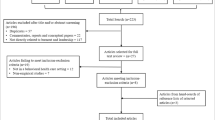Abstract
This study investigated employee perceptions of ethical climates in a sample of Russian organizations and the relationship between ethical climate and behaviors believed to characterize successful managers. A survey of managerial employees in Russia (n = 136) indicates that "rules" was the most reported and "independence" was the least reported ethical climate type. Those who perceived a strong link between success and ethical behavior report high levels of a "caring" climate and low levels of an "instrumental" climate. Implications for practitioners and researchers are discussed.
Similar content being viewed by others
References
Carroll, S. J. and M. J. Gannon: 1997, Ethical Dimensions of International Business (Sage, Thousand Oaks).
Corwin, J. and D. Stanglin: 1994, ‘The Looting of Russia’, US News & World Report, March 7, pp. 36–41.
Deshpande, S.: 1996, ‘Ethical Climate and the Link between Success and Ethical Behavior: An Empirical Investigation of a Non-Profit Organization’, Journal of Business Ethics 15, 315–320.
Devellis, R. F.: 1991, Scale Development: Theory and Applications (Sage, Newbury Park).
Diacon, S. R. and C. T. Ennew: 1996, ‘Can Business Ethics Enhance Corporate Governance? Evidence from a Survey of UK Executives’, Journal of Business Ethics 15, 623–634.
Fritzche, D. J. and H. Becker: 1984, ‘Linking Management Behavior to Ethical Philosophy’, Academy of Management Journal 27, 166–175.
Hunt, S. D., L. B. Chonko and J. B. Wilcox: 1984, ‘Ethical Problems of Marketing Researchers’, Journal of Marketing Research 21, 309–324.
Kaplan, F.: 1993, ‘The Color of Money in Russia: Black’, Boston Globe, April 25, pp. 17, 19.
Kohlberg, L.: 1967, ‘Moral and Religious Education and the Public Schools: A Developmental View’, in T. Sizer (ed.), Religion and Public Education (Houghton Mifflin, Boston), pp. 164–183.
Kohlberg, L.: 1984, The Philosophy of Moral Development (Harper & Row, New York).
Neimanis, G.: 1997, ‘Business Ethics in the Former Soviet Union: A Report’, Journal of Business Ethics 16, 357–362.
Nunnally, J.: 1978, Psychometric Theory, 2nd edition (McGraw-Hill, New York).
Puffer, S. M.: 1994, ‘Understanding the Bear: A Portrait of Russian Business Leaders’, The Academy of Management Executive 8, 41–54.
Puffer, S. M.: 1996, Business and Management in Russia (Edward Elgar, Brookfield).
Puffer, S. M.: 1992, The Russian Management Revolution (M.E. Sharpe, New York).
Puffer, S. M. and D. J. McCarthy: 1996, ‘Finding Common Ground in Russian and American Business Ethics’, in S. M. Puffer (ed.), Business and Management in Russia (Edward Elgar, Brookfield).
Rodrigues, C.: 1996, International Management: A Cultural Approach (West, Minneapolis/St.Paul).
Sebastian, P.: 1992, ‘Non-Profit Group Seek Ethics Standard’, The Wall Street Journal, October 30, p. 7A.
Schneider, B.: 1983, ‘Work Climates: An Interactionist Perspective’, in N. W. Feimer and E. S. Geller (eds.), Environmental Psychology: Directions and Perspectives (Praeger, New York), pp. 106–128.
Vitell, S. J. and D. L. Davis: 1990, ‘Ethical Beliefs of MIS Professionals: The Frequency and Opportunity for Unethical Behavior’, Journal of Business Ethics 9, pp. 63–70.
Victor, B. and J. B. Cullen: 1990, ‘A Theory and Measure of Ethical Climate in Organizations’, in W. C. Frederick and L. E. Preston (eds.), Business Ethics: Research Issues and Empirical Studies (JAI Press Inc., Greenwich, CT), pp. 77–97.
Viswesvaran, C. and S. P. Deshpande.: 1996, ‘Ethics, Success, and Job Satisfaction: A Test of Dissonance Theory in India’, Journal of Business Ethics 15, 1065–1069.
Welsh, D. H. B., F. Luthans and S. M. Sommer: ‘Managing Russian Factory Workers: The Impact of U.S. Based Behavioral and Participatory Techniques’, Academy of Management Journal 36, 58–79.
Williams, B.: 1985, Ethics and the Limits of Philosophy (Harvard University Press, Cambridge, MA).
Wimbush, J. C. and J. M. Shepard: 1994, ‘Toward an Understanding of Ethical Climate: Its Relationship to Ethical Behavior and Supervisory Influence’, Journal of Business Ethics 13, 637–647.
Zabid, A. R. M. and S. K. Alsagoff: 1993, ‘Perceived Ethical Values of Malaysian Managers’, Journal of Business Ethics 12, 331–337.
Author information
Authors and Affiliations
Rights and permissions
About this article
Cite this article
Deshpande, S.P., George, E. & Joseph, J. Ethical Climates and Managerial Success in Russian Organizations. Journal of Business Ethics 23, 211–217 (2000). https://doi.org/10.1023/A:1005943017693
Issue Date:
DOI: https://doi.org/10.1023/A:1005943017693




